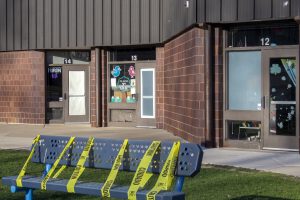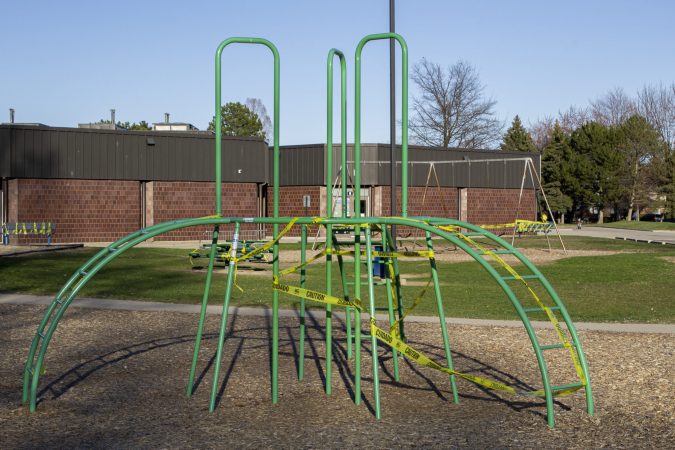COVID-19 and the economic crisis brought about by it have changed everyday life in many different ways, from the food we love to eat at our favorite restaurant, to even how teaching in an elementary classroom in conducted. Michigan classrooms fundamentally changed overnight because of the coronavirus, first schools were closed for a few weeks, and now a few weeks after that, Governor Gretchen Whitmer officially canceled all in-person gatherings for all K-12 school’s in Michigan.
The governor’s order effectively puts the plan moving forward into the hands of Michigans school districts, who will be required to create local plans for remote learning. The move will not impact any graduating seniors, besides being unable to attend their senior proms and commencements, teachers and school employees will still receive their full pay, any state-administered test will be canceled and the 2020-2021 school year will begin after labor day per usual.
“My number one priority right now is protecting Michigan families from the spread of COVID-19,” Shared Whitmer in a released statement. “For the sake of our students, their families, and the more than 100,000 teachers and staff in our state, I have made the difficult decision to close our school facilities for the remainder of the school year.”
In light of the situation, we spoke with some teachers around Metro Detroit before and after Whitmer’s decision to hear their thoughts, their experiences, and just how different their jobs have been in light of an increasingly out of the ordinary situation.
TEACHING DURING COVID-19
When classes were suspended on March 16, 2020, there wasn’t much warning to students, staff, or parents besides talk and the general news around the rapidly expanding pandemic. After closing, many schools were on their own, coming up with lesson plans, some began using the now controversial Zoom, while others started sending home learning packets of materials. For many teachers and students, this new medium for teaching was a big leap from the ordinary.

SOME CLASSROOMS HAVE HAD TO UTILIZE PLATFORMS LIKE ZOOM FOR TEACHING. PHOTO ZOOM
Rachel, a high school teacher in Detroit, shared that while her students were given computers, they had not used Zoom or any other video software before the school closing, and were slightly unfamiliar with the process. While online lessons continued, it was a struggle to adapt, and some teachers found themselves scrambling to ensure their students were prepared for the leave of in-person absence.
“It has been a bit tough. My students were given computers, but we had not been using them every day in the classroom up until that point. We did not use Google Classroom or Zoom or anything like that regularly until three weeks ago. I am fortunate to have many resources already available to me online, but I know many teachers who literally scanned textbooks before we left because they didn’t have what they needed otherwise,” shared Rachel. “The biggest struggle is getting so many students connected to a brand new platform and teaching them to use it at the same time. If you were rolling out a new digital learning plan with new devices, materials, and requirements, this would not be the way to do it. But we had no choice.”
In the Macomb Intermediate School District, Shana Duncan, a special education teacher within Chippewa Valley schools, utilized Zoom for some online teaching but expressed great regret about the time she will be missing with her students. Duncan expressed her comments before the closure and had been holding onto the hope that she would have time to see her students in person again.
“I truly hope that this is the only time I am asked to teach virtually because, as a special education teacher, it is absolutely not ideal. I also hope this is the only time in my career or lifetime that we will see a pandemic of this magnitude,” shared Duncan. “I know that if the governor decides to shut down schools for the remainder of the year that we will make the most of our time teaching and learning virtually. But selfishly, I still am holding out hope for a few weeks with my students. I’d even settle for one more day!”
While Zoom has been utilized for online teaching temporarily, many schools have begun to avoid using the platform due to security concerns. In other cases, some teachers were unable to utilize the online platform entirely. In the Detroit Public School System [DPS], one teacher shared that while they were not currently conducting online teaching in their school, the district did have resources available online.
The first-grade teacher, who asked to remain anonymous, shared that many teachers have taken it upon themselves to create supplemental packets or videos they could share with their students.
“The district has supplemental materials that students can access online, or they’re being given out by the district at the food distribution center, and then I personally created an additional packet for my students, just knowing what resources I had and knowing my students well to know what activities they really enjoy so that their parents don’t necessarily, or their families I should say, don’t necessarily have to guide them through everything,” they shared.
For the students in other classrooms, the unnamed teacher also shared that their colleagues have taken a similar approach, including making YoutTube videos for students to watch, as well as extra learning packets tailored to their specific classrooms. The unnamed teacher also shared that they have dropped off some packets in-person to students whose families do not have access to a printer and that they also have emailed online worksheets to a number of their students.
Despite the struggles of teaching away from the classrooms, teachers from across Metro Detroit are showing a commitment to their students, from making videos, packets, or learning guides, to calling students just to chat and make sure everything is going alright at home.
CONCERNS FOR STUDENTS
The lack of in-person teaching comes with other concerns than solely deciding how lesson plans will be distributed. Some teachers shared grievances about the education opportunities their students may be missing out on during stay at home leave.

AN EMPTY ELEMENTARY SCHOOL IN METRO DETROIT. PHOTO JOHN BOZICK
In Detroit, Eradajere Oleita, a Green School Facilitator currently working in DPS, shared, “To worry is human when your normal is constantly changing. I worry about the students who don’t have access to electronics and internet support. I worry about students who need a little more help with learning, not getting that support. I worry about how students are getting fruitful information and how they are going to apply it. I worry about the lack of motivation when next year we have to go over all the information we missed. I worry about how this will affect their transcripts.”
The anonymous first-grade teacher in Detroit expressed similar sentiments, sharing how the week leading up to the school closures was critical in their student’s learning process. But, at the same time, they also believed that the safety of their students and the staff they work with is of the utmost importance.
“The week leading up to this was actually one of like the strongest weeks in my classroom, so I had just a lot of students really engaging with the material it was clear that things were starting to click. I had like a very large group of emergent readers that were, like, really strongly emerging,” the teacher shared, “So I am concerned, but also, our student’s safety is the most important thing, and then right after that is fact safety. And right now, like it’s not safe for anyone to be in those classrooms, and now that we’ve closed the schools, there still is a safety thing. Some students really rely on school as a stable factor and what can be a very unstable life. So for me, my concern is mainly – How are we, ensuring that our students are still receiving the emotional and mental, and even physical health and well being, that they were receiving from being school.”
Rachel, the high school teacher in Detroit, also expressed a worrying attitude toward her students and wanted to ensure she was there for them at every turn. For many students in Detroit Public Schools, the support found in the classroom is essential.
“Try explaining to an 18-year old who was already struggling and balancing a job that he needs to continue to work online even though he hears that it won’t matter or everyone will graduate. I am sympathetic. I have tried very hard to be transparent to my students and flexible with grades and deadlines,” she shared, “I have been answering every single message they send me, and there have been many. I want to be a force of reassurance to them as people, not just as students. Quite a few have reached out to me to say thank you and that it means a lot that I am here for them. But it’s the reason we all got into teaching, right? This is an unprecedented time, and I want them to know that I care about them, even from behind a screen.”
In Macomb, Chelsea Eovaldi, a kindergarten teacher, expressed that while she missed her young students greatly, she was remaining positive in light of the situation.
“I am worrying about my students during this time apart. Leaving school was so abrupt, and we tried to send home as many supplies as we could with such short notice,” shared Eovaldi, “This is an unprecedented time, and we are learning how to shift from in-person learning to online learning. Even though this was unexpected, everyone is doing their very best, and we are all in the same boat together. We will work through all of the challenges together!”
HOPE FOR THE FUTURE
Despite the concerns and ever-changing situation, the teachers are remaining hopeful, while some are also expressing wishes for more coordination and support at the state and federal level. But in the end, while talking with teachers from the region, one can tell they are a group of individuals committed to using any resources in their power to find to help their students get the education they deserve.
In Macomb, Shana Duncan expressed support for the work being done in her district, stating, “Chippewa Valley Schools is doing a wonderful job of getting families what they need. Many School Messengers have been sent out with surveys to see what supplies families need. Monday-Friday, there is breakfast and lunch available for all children. I am proud to be apart of this district. They have come up with so many wonderful ways of keeping our students learning during this difficult time. In my own classroom, I have enjoyed seeing pictures from my families of what they are doing at home, and I share it on our classroom Instagram so that the students can still see what their friends are up to. I also wrote my student’s letters and sent them some snail mail to let them know I have been thinking of them. I am enjoying writing back and forth with them, and it is great for their writing skills!”
Amy, who also works within the Chippewa Valley School District, shared that she would like to see more expectations from the state, sharing, “I would like the state to give the same educational expectations for all districts. It has to be unified. I am hearing that every district is doing something different. Zoom meetings, Skype meetings, just providing activities, some districts are taking attendance and grades, others are not. It is very inconsistent. I know we have never been in this situation before, but a set of guidelines would be helpful.”
In Detroit, Eradajere Oleita also wished for support if something similar to this situation arises in the future, sharing, “I want to see more transparency with Michigan schools. I would also like more support for students and families: i.e., every student should have access to a personal internet-connected device provided by the school. I would like to see more support for different learning styles and more people learning how to handle setbacks best.”
Citing the uniqueness of the situation, Chelsea Eovaldi expressed the need for understanding and kindness at this time, sharing,
“I want to see understanding and kindness during this time. No one expected this to happen. We are all just trying to do our very best while staying safe and healthy. I hope that our federal government will do its very best to get supplies to the places needed.”
While COVID-19 and the crisis around it continues, it’s important to remember everyone who is playing their part, from those on the frontlines in ambulances and hospitals to the people braving their workday to stock our shelves. The teacher is right up there with the doctor and grocery clerk, going above and beyond their regular duties to ensure that the students they care for so much, receive a quality education. Be it from a zoom call or a printed out packet of papers, Metro Detroit teachers have continued to hustle amid so much.
In talking with teachers, it’s known that many districts have set up some sort of network to support students during the closure. If you’re looking to give back, contact your local district or a teacher you may know, there are countless ways you may be able to support.























